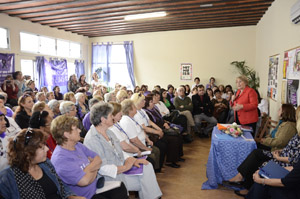Empowering the Women of Uruguay through Gender-Sensitive Budgeting
Date:

Fifteen years ago, Aurora Castro, along with other women she knew in the Carrasco Norte district of Montevideo, dreamed of having a place where women could come together to discuss their problems and concerns. Today, that dream has become a reality at the Centre for Women. Castro is proud of their accomplishment; the sense of satisfaction she exuded during her November 9 meeting with Michelle Bachelet, the Executive Director of UN Women, was palpable.
Now 69 years old, Castro remembers the setbacks and frustrations that at many stages led her and other women involved in the initiative to consider giving up. But their concern for women living in their neighbourhood meant that they persevered. Castro was especially preoccupied with the issue of violence against women, and aware that a gender-based violence complaint was filed with the Uruguayan police every 34 minutes. She also knew that, as of November 2011, 36 women had died at the hands of their partners or ex-partners.
Castro, along with the other women who helped establish the centre, knew that financial resources for the project would be challenging to obtain. But they came to realize that there would be power in numbers. The women of Montevideo needed to realize they were not alone, that their problems were not unique.
“It was clear to us that the specific needs of women living in our district were far from being met, Castro said, “that women felt cut off from each other, that they were simply not aware of how they could exercise their legal rights, and that the scourge of intra-family violence was not being met head-on.
All of these shortcomings were catalysts for a call to action. The first time that Castro and other women campaigners attended a meeting at the mayor's office in Montevideo to discuss participative budgets (a method by which the members of a neighbourhood decide how best to spend specific resources allocated to their district) their advocacy fell on deaf ears.
On their second attempt, this time with the help of UN Women, they prepared a strategy, and defined key priorities as an integral part of their campaign. Castro and her friends knocked on the door of every neighbour in the district in order to explain their proposal.
“Of course, many people asked us why we wanted to establish a centre that was for women only, Castro said, “And you can rest assured that we had to come up with good reasons to win their votes.
The campaign was a success, and the women built their centre. Today, it hosts a wide range of activities, including workshops on gender and violence, language courses, and other activities such as crocheting, weaving and drama classes. Furthermore, the lawyers who worked with Castro and her fellow campaigners were happy to coach them so that they could give legal advice to other women and provide them with information on their rights regarding divorce, child custody and other issues relating to family law.
UN Women supported the women throughout their project, helping them make their case to the mayor's office for the incorporation of gender perspectives in participative budgets. UN Women continues to work with women throughout Montevideo to increase their awareness of how they can transform their neighborhoods and empower themselves.
While Castro is happy with what has been achieved so far, she is far from being complacent.
“Since we founded the Centre for Women, Castro said, “we have achieved greater visibility, and every day more and more women come to visit us, so as to see what the centre is all about. Of course, this is a very exciting development, but the next challenge is to develop a strategy for taking our message out there, to those women who live in the hinterland of Uruguay, far from the capital of Montevideo, and who must surely feel even more isolated from one another.